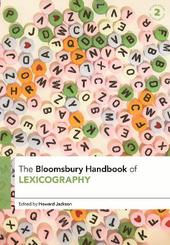
|
The Bloomsbury Handbook of Lexicography
Hardback
Main Details
| Title |
The Bloomsbury Handbook of Lexicography
|
| Authors and Contributors |
Edited by Professor Howard Jackson
|
| Series | Bloomsbury Handbooks |
|---|
| Physical Properties |
| Format:Hardback | | Pages:512 | | Dimensions(mm): Height 244,Width 169 |
|
| Category/Genre | Semantics |
|---|
| ISBN/Barcode |
9781350181700
|
| Classifications | Dewey:413/.028 |
|---|
| Audience | | Tertiary Education (US: College) | |
|---|
| Edition |
2nd edition
|
|
Publishing Details |
| Publisher |
Bloomsbury Publishing PLC
|
| Imprint |
Bloomsbury Academic
|
| Publication Date |
24 March 2022 |
| Publication Country |
United Kingdom
|
Description
A definitive guide to the long tradition of lexicography, this handbook is a rigorous and systematic overview of the field and its recent developments. Featuring key topics, research areas, new directions and a manageable guide to beginning and developing research in the field, this one-volume reference provides both a survey of current research and more practical guidance for advanced study. Fully updated and revised to take account of recent developments, in particular innovations in digital technology and online lexicography, this second edition features: - 6 new chapters, covering metalexicography, lexicography for Asian languages, lexicography for endangered and minority languages, onomasiological lexicography, collaborative lexicography, and internet dictionaries - Thoroughly revised chapters on learner dictionaries, bilingual dictionaries and future directions, alongside a significantly updated third part on 'New Directions in Lexicography', accounting for innovations in digital lexicography - An expanded glossary of key terms and an updated annotated bibliography Identifying and describing the central concepts associated with lexicography and its main branches of study, The Bloomsbury Handbook of Lexicography demonstrates the direct influence of linguistics on the development of the field and is an essential resource for anyone interested in this area.
Author Biography
Howard Jackson is Emeritus Professor of English Language and Linguistics at the School of English at Birmingham City University, UK.
ReviewsAn enormously valuable and instructive starting point for research into lexicography and meta-lexicography; the contributions include helpful and detailed examples, and the relatively compact size of each paper makes the book particularly manageable for students and other researchers. * The Year's Work in English Studies (of the first edition) * A strong catalyst for lexicographers of every stripe. It presents contemporary research, summarized for review at a readable scale, with the happy outcome that both specialists and new researchers may reach a clearly contextualized understanding of the trajectories of sub-fields other than their own. * Kernerman Dictionary News (of the first edition) * This volume is useful for students who know little about lexicography, or for professors who use lexicons consistently and want to become more aware of the issues involved in approaching them. * Exegetical Tools Quarterly (of the first edition) * Beautifully edited and organized. * SKY Journal of Linguistics (of the first edition) * An excellent resource that I would strongly recommend for students of lexicography and practitioners alike ... This new edition is a valid and valuable contribution to the library of lexicographic research. * Lexikos * The new Bloomsbury Handbook to Lexicography provides students and researchers with a comprehensive and highly accessible overview of a field that has changed dramatically over the last decades. The 25 chapters and more than 800 pages, written by leading dictionary experts from all over the world, are focused on the key issues of dictionary writing and research, and explore the many questions that lexicographers have to solve and metalexicographers to assess. -- Henri Bejoint, Emeritus Professor, University Lyon 2, France Howard Jackson has designed the quintessential handbook for insights into dictionary research and metalexicography. With its current revisions and updates, this volume will be an important resource for students and scholars of lexicography for many years to come. -- Sarah Ogilvie, Senior Research Fellow in Linguistics, University of Oxford, UK
|